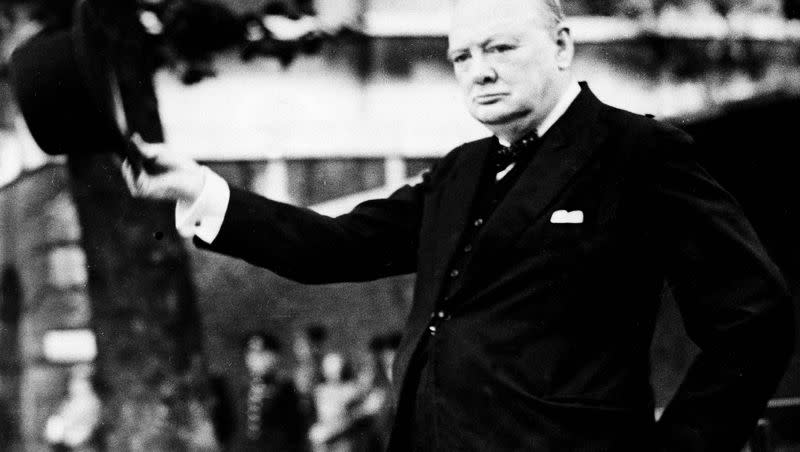2 indispensable speeches from Winston Churchill that demonstrate the power of words

- Oops!Something went wrong.Please try again later.
Winston Churchill has been remembered since his passing on Jan. 24, 1965, as many things: a statesman, writer and leader, but many remember him as one of the “greatest speakers of the 20th century.”
Churchill once said, “Of all the talents bestowed upon men, none is so precious as the gift of oratory. He who enjoys it wields a power more durable than that of a great king. He is an independent force in the world. Abandoned by his party, betrayed by his friends, stripped of his offices, whoever can command this power is still formidable.”
America’s National Churchill Museum published various audio clips and transcripts from many of Churchill’s most iconic speeches and after careful review, there are two that demonstrate the power words hold.
“Blood, Toil, Tears and Sweat” and “Their Finest Hour” are some of Churchill’s most indispensable speeches and here’s why.
Related
‘Blood, Toil, Tears and Sweat’
Just as Churchill was stepping into his new role as prime minister, he was facing pressure to negotiate a peace deal with Hitler, according to the BBC.
Despite the pressures he was facing, he reportedly “made it clear” that the only option was to “wage war” against Nazi Germany and their vision for leadership.
Churchill emphasized his standpoint in his speech, saying, “We have before us an ordeal of the most grievous kind. We have before us many, many long months of struggle and of suffering. You ask, what is our policy? I can say: It is to wage war, by sea, land and air, with all our might and with all the strength that God can give us; to wage war against a monstrous tyranny, never surpassed in the dark, lamentable catalogue of human crime. That is our policy.”
U.K. Parliament reported that this “inaugural” speech as a “wartime leader” showed his proficiency in rhetoric and leadership.
“You ask, what is our aim? I can answer in one word: It is victory, victory at all costs, victory in spite of all terror, victory, however long and hard the road may be; for without victory, there is no survival,” Churchill said.
Not only did this speech reportedly make Churchill’s career from the outset, it inspired the British to step up and fight against the Germans who had been attacking.
Prior to Churchill’s speech, “a lot of punching, hammering, rushing and blasting — had been done by the Germans. It was the British who went out backwards, faster than they had come in,” Time reported in May 1940.
Time later reported that Churchill’s words “established a new British attitude toward the growing conflict — and a reputation that would keep him in the Prime Minister’s office through the end of the war in Europe.”
Michael Elliott, a reporter for Time in 1940, wrote that what Churchill “gave his country, above all, was leadership.”
Related
‘Their Finest Hour’
As the Second World War was raging on, Churchill used the power of words to ignite hope and “lift the spirits of the public” despite the terrifying circumstances that were increasing during that time.
The speech, given on Jun. 18, 1940, ended with the words, “Let us therefore brace ourselves to our duties, and so bear ourselves that if the British Empire and its Commonwealth last for a thousand years, men will still say, ‘This was their finest hour.’”
Though the words from that speech have been revered throughout the decades since Churchill said them, the speech was reportedly a difficult task as the famous wordsmith was at a “loss for words.”
Time magazine reported that the screenwriter of “Darkest Hour,” Anthony McCarten, said, “One of the real revelations for me was to find how uncertain he was during this period, because history as we’re handed it tells us he was unyielding.”
The Library of Congress published a small extract from the original draft of the speech that shows some edits Churchill made to the original typing.
“When you look at the manuscripts of those speeches, there is so much crossing out and rewording. As a writer, I could feel that these words didn’t spring whole from his imagination. He had to hack them out of a rock, and they didn’t come easily. He was under enormous pressure,” McCarten further elaborated.
The BBC reported that Churchill’s speeches were typically not “off-the-cuff” and that this particular speech was no different.
Churchill reportedly spent “much time” in preparation before delivering any of them to the public.
“It’s the most important moment in Churchill’s life and career and the most important historical turning point of the 20th century,” International Churchill Society Executive Director Michael Bishop said. “It was really the moment when Hitler could have won the war.”
NPR reported that BBC correspondent Charles Wheeler, who was 16 years old in 1940, said that Churchill was a leader the country needed at the time and delivered a speech the country needed.
“His rhetoric, nowadays, sounds desperately overblown and rather old-fashioned. But at the time, it seemed exactly right. It struck all the right notes,” Wheeler said.

